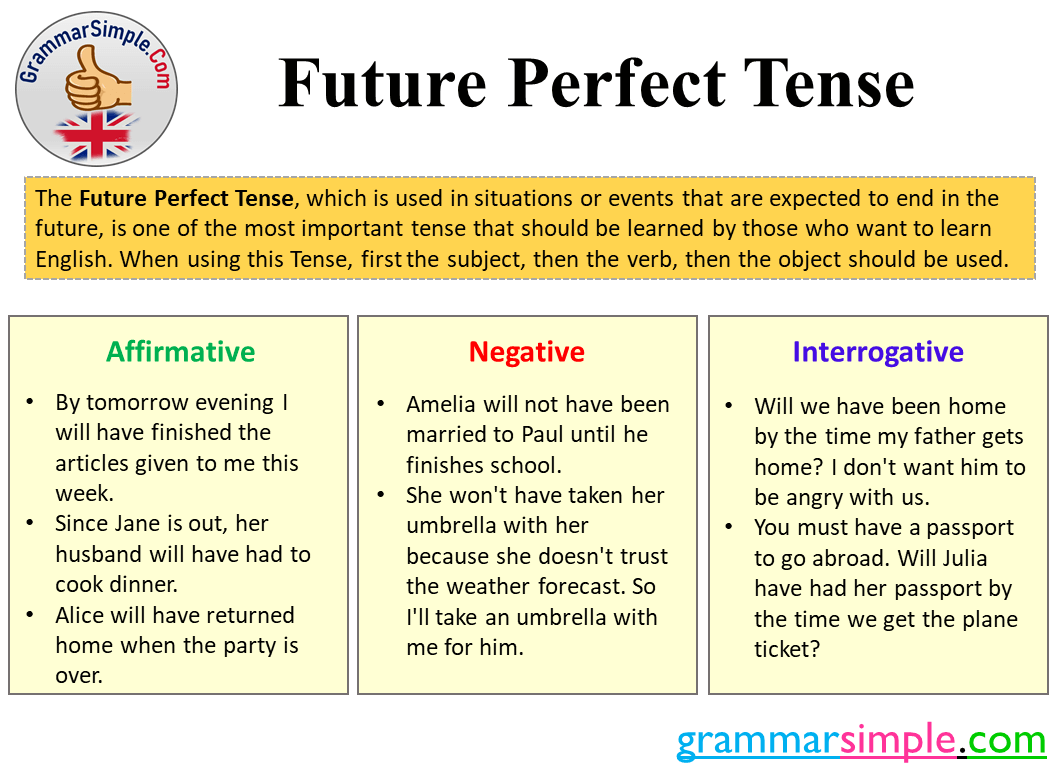Future Perfect Tense Definition, Affirmative, Negative and Interrogative Sentences


Future Perfect Tense Definition, Affirmative, Negative and Interrogative Sentences
Table of Contents
Future Perfect Tense
The Future Perfect Tense, which is used in situations or events that are expected to end in the future, is one of the most important tense that should be learned by those who want to learn English. When using this Tense, first the subject, then the verb, then the object should be used. For Future Perfect Tense, Future Tense suffix “will”, Perfect Tense suffix “have” and verb conjugated to the third form is used.
How to Use Future Perfect Tense?
For actions completed before an event, action, or situation that will occur in the future, Future Perfect Tense can also express that an action will occur before a future situation. Adverbs of “by”, “by the time” and “when” can be encountered in Future Perfect Tense sentences. The adverb “by the time” must be used with a sentence, while the adverb “by” can be used with any word that indicates time.
Example of a sentence using the adverb “By the time”: By the time my husband arrives home, I am going to have prepared my surprise for my husband.
Example of a sentence using the adverb “By”: By next year, I will have graduated.
The Future Perfect Tense can also be used before a future action. When this Tense is used with static verbs, it is told that an action in the future will continue until another action will take place in the future.
Example of a sentence suitable for an explanation: I will have studied in this university by the time I graduate.
While making a sentence with Future Perfect Tense, the sentence in which Future Perfect Tense is used should not be used after time expressions such as “when, while, before, after, by the time, as soon as, if, unless”, it would be a very big grammatical error.
Future Perfect Tense Grammar Rules
Affirmative Sentences: You should know that the auxiliary verb “have” that you will use while making a positive sentence with the Future Perfect Tense will not change according to the subject, you also need to use the third form of the verb.
- By tomorrow evening I will have finished the articles given to me this week.
- Since Jane is out, her husband will have had to cook dinner.
- Alice will have returned home when the party is over.
- By the time my roommate finds my prank trick on her, I’ll have already left the dorm.
Negative Sentences: To make a negative sentence with Future Perfect Tense, it will be sufficient to add “not” to the auxiliary verb “will”. All other rules are the same as affirmative sentence rules.
- Amelia will not have been married to Paul until he finishes school.
- She won’t have taken her umbrella with her because she doesn’t trust the weather forecast. So I’ll take an umbrella with me for him.
- Mom won’t have made a cake for my birthday because she wants us all to eat healthily.
Interrogative Sentences: In the interrogative sentences you will make with the Future Perfect Tense, the auxiliary verb “Will” should come first, then the subject should be used, then have and the verb in the third state should be used.
- Will we have been home by the time my father gets home? I don’t want him to be angry with us.
- You must have a passport to go abroad. Will Julia have had her passport by the time we get the plane ticket?
- I will come home very hungry in the evening, will you have had your dinner by 8 pm?
Recent Posts
Use Rose in a Sentence, How to Use Rose with Example Sentences
Use Rose in a Sentence, How to Use Rose with Example Sentences
Use Yourself in a Sentence, How to Use Yourself with Example Sentences
Use Yourself in a Sentence, How to Use Yourself with Example Sentences
Use Picture in a Sentence, How to Use Picture with Example Sentences
Use Picture in a Sentence, How to Use Picture with Example Sentences
Use Claim in a Sentence, How to Use Claim with Example Sentences
Use Claim in a Sentence, How to Use Claim with Example Sentences
Use Treasure in a Sentence, How to Use Treasure with Example Sentences
Use Treasure in a Sentence, How to Use Treasure with Example Sentences
Use Raise in a Sentence, How to Use Raise with Example Sentences
Use Raise in a Sentence, How to Use Raise with Example Sentences